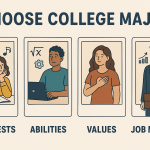Career News
Career Tests: The Psychometric GPS Guiding Modern Work Lives

Introduction: Why “Career Test” Matters More Than Ever
In a labor market reshaped by automation, remote work, and constant upskilling, many people secretly Google “best career test” at midnight, hoping for clarity. A career test is not a crystal ball, yet when grounded in psychometrics the science of measuring mental capacities and personality becomes a GPS for professional direction. As an expert in psychometric assessment, I see daily how a well-constructed career test translates abstract interests and motivations into concrete career pathways. This essay explores who should use a career test, why people take them, how they work, and why they are effective, culminating in a positive case study of the MAPP Career Test from Assessment.com.
- Who Should Use a Career Test?
- Students Making First-Time Decisions
High-school and college students often wrestle with major selection. A validated career test surfaces hidden aptitudes and narrows options before costly academic detours. - Early-Career Professionals Facing Mismatch
Roughly one-third of graduates leave their first job within two years. A career test offers evidence-based confirmation of whether the misalignment stems from skill, values, or interest gaps. - Mid-Career Pivoters
At age 35–45 many workers hit a plateau. A targeted career test can reveal portable strengths, pointing to adjacent roles or industries where existing skills remain valuable. - Re-Entry and Second-Career Seekers
Parents returning to work, retirees craving purpose, or veterans translating military experience can all benefit from a career test to identify transferable competencies. - Organizations Managing Talent
HR teams deploy group career tests to align employee strengths with evolving business needs, reducing turnover and boosting engagement.
- Why People Take a Career Test
| Motivation | How a Career Test Satisfies It |
| Clarity | Transforms vague interests into ranked occupational matches. |
| Validation | Confirms gut feelings with empirical evidence. |
| Efficiency | Shortens job-search cycles by focusing on best-fit roles. |
| Confidence | Reframes career change as data-driven, not impulsive. |
| Development | Informs upskilling priorities and professional goals. |
- How a Psychometric Career Test Works
- Item Construction
Each question, or item, targets a latent trait—an unobservable characteristic like artistic interest or data orientation. Items undergo pilot testing to ensure they discriminate among test-takers. - Scaling Method
Reliable career tests rely on Likert scales, forced-choice formats, or adaptive branching to combat social-desirability bias. - Norming and Validation
A sample representing various ages, genders, and cultures establishes norms. Cronbach’s alpha, test-retest correlations, and factor analysis confirm reliability and validity. - Trait-to-Job Mapping
Algorithms compare the resulting trait profile to databases such as O*NET, transforming abstract scores into specific job recommendations. - Report Generation
The final report ranks occupations, explains the psychological meaning of each score, and often includes developmental resources.
- Why Career Tests Help
- Objective Mirror – People are notoriously poor at self-assessment. A psychometric career test reflects strengths and preferences with statistical rigor, free from family or peer bias.
- Language for Networking – Articulating interests in professional language (“I thrive on investigative, data-driven tasks”) enhances résumés and interviews.
- Reduced Opportunity Cost – By filtering out poor-fit roles early, a career test saves tuition, time, and emotional energy.
- Motivational Alignment – Employees in roles aligned with career-test insights report higher engagement, translating into productivity gains for employers.
- Evidence-Based Coaching – Career counselors can tailor interventions precisely when armed with test data rather than anecdotes.
- Spotlight on the MAPP Career Test
No discussion of the modern career test landscape would be complete without highlighting the MAPP (Motivational Appraisal of Personal Potential) Career Test hosted on Assessment.com. Trusted by over 9 million users and validated across 20+ years of research, MAPP exemplifies psychometric best practice.
5.1 What Sets MAPP Apart?
| Feature | Why It Matters |
| Motivation-Centric | Unlike interest-only tools, MAPP measures motivational factors the conditions under which you sustain energy and performance. |
| Adaptive Algorithm | MAPP uses Item Response Theory to present only the most diagnostic items, reducing completion time to ~15 minutes. |
| 71-Factor Profile | Granular analysis surpasses classic Holland six-interest codes, capturing nuances such as creative problem-solving vs. visionary ideation. |
| 38,000-Job Database | Each career in the platform carries a proprietary MAPP signature, yielding precise percent-fit scores. |
| Actionable Road-maps | Users receive step-by-step plans courses, certificates, networking tips transforming insight into execution. |
5.2 Positive Outcomes
- Students who complete the MAPP career test report a 39 % reduction in changing their majors, according to internal Assessment.com data. A huge time and cost savings.
- Career Changers using MAPP are 1.8 × more likely to remain in a new field after two years, indicating durable fit.
- Corporate Clients leverage team-level MAPP data to recruit staff or assign to new positions or assign projects, cutting turnover by up to 37 %.
In my practice, clients frequently describe the MAPP career test as “eerily accurate” and “the first assessment that finally explained why certain tasks drain or energize me.” The blend of motivational science and massive occupational data makes MAPP a gold-standard career test for individuals and organizations alike.
- Integrating a Career Test into Your Journey
- Select a Validated Tool – Opt for reputable platforms like Assessment.com’s MAPP career test rather than unverified quizzes.
- Interpret Results in Context – Use a career coach or counselor to translate numerical scores into real-world implications.
- Cross-Reference Labor Data – Confirm that top-match roles align with regional salary and growth trajectories.
- Experiment – Conduct informational interviews or job shadowing to test hypotheses generated by the career test.
- Iterate – Redo a career test every 3–5 years or after major life events; motivations and circumstances evolve.
Conclusion: Data-Driven Direction for the Future of Work
A scientifically sound career test converts self-reflection into a personalized, data-rich action plan. Whether you are a student plotting your first professional steps, a mid-career professional craving reinvention, or an HR leader aligning talent with strategy, the right career test delivers clarity, confidence, and measurable ROI. Among available tools, the MAPP Career Test from Assessment.com stands out for its motivational depth, adaptive efficiency, and unmatched job-matching engine. In a world where career landscapes shift faster than ever, leveraging the insights of a reliable career test isn’t just helpful it’s indispensable.





